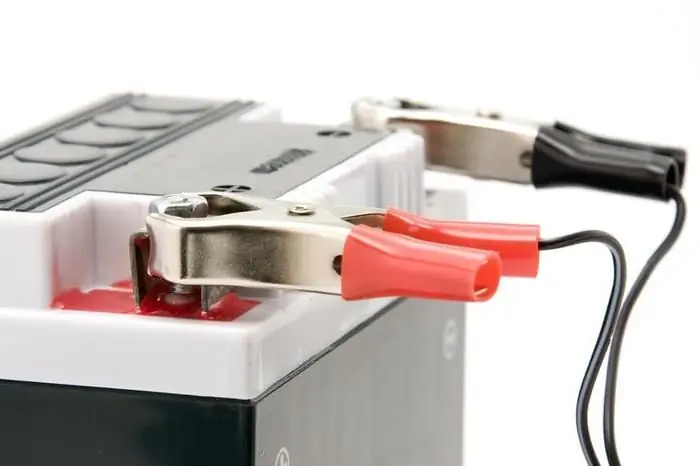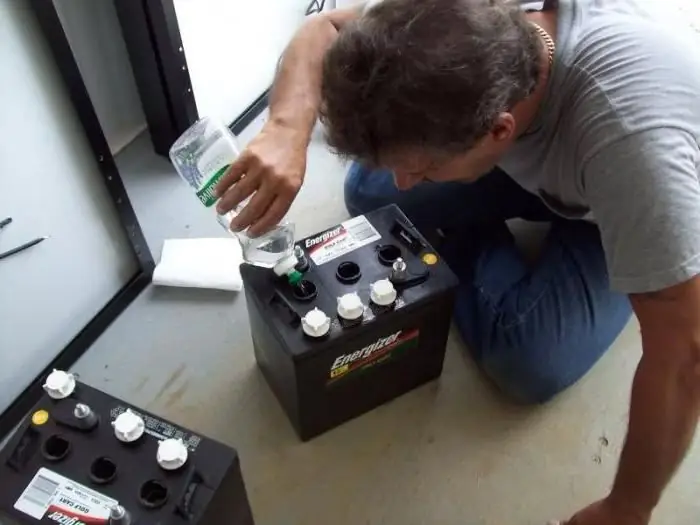2026 Author: Erin Ralphs | ralphs@carsalmanac.com. Last modified: 2025-06-01 05:35:55
The battery is an important part of any car. Not only is it the power source for all on-board electronics, but it also offloads the alternator and helps start the engine. Proper care and timely charging of the battery is the key to its successful and long-term operation. However, there are some nuances that may alert the driver. For example, why does the battery boil when charging?
Battery and its types

All batteries are divided into three types:
- Serviced. The cheapest type. The battery has special openings for replacement and repair of plates. In such batteries, you need to constantly monitor the electrolyte level and periodically top up with distilled water. There are not so many similar batteries left on the market.
- Maintenance free. A relatively new type of battery. Their body is completely sealed. Aselectrolyte often use helium, which does not evaporate. The battery has an extended life and is not too whimsical to care for. Its only drawback is the price.
- Low serviced. This is the middle option between the previous two. In such batteries, there is no access to the plates, but control over the electrolyte level is required. A low-maintenance battery can be purchased both flooded and dry-charged (“for growth”). The battery has good performance and reasonable price.
Each of the types shown will last a long time without causing problems, but with proper care.
How to properly charge the battery?
The battery is charged periodically. If the density of the electrolyte has decreased by 0.08 g/cm3. - The battery is half discharged. The headlights, which quickly go out, can also indicate the discharge of the battery; slow starter; electrolyte color changes (clouding, darkening).
Before charging the battery, you need to clean it of dirt, check the gas outlets and add water.

Charge the battery with a current, the strength of which is 1/10 of its capacity. Charging time - 12-16 hours. So, a battery with a capacity of 75 Ah needs to be charged with a current of 7.5 A.
Battery boils while charging and releases harmful gas. Therefore, charging should be done in a well-ventilated area, away from crowds. The battery must be placed on a level surface. After charging is complete, the batterywipe with a dry cloth and install back.
Why is the battery boiling while charging?

This question interests many drivers, and most of all beginners. Boiling can occur for two reasons. You should pay attention to the process itself. If a small amount of bubbles appears, this is normal. This is how gas is released. This happens before the end of charging. If the battery boils immediately when charging, it's bad. Perhaps he has already become unusable. You can try to revive him by doing the following:
- Clean the case and terminals from dirt.
- Add electrolyte.
- Wipe the surface of the battery with an alkaline (soda) solution.
These procedures are best done before charging. A he althy battery boils when charged for only a couple of hours at the end (2-3 hours). Any other boiling is a sign of malfunction. Do not ignore this sign, because sometimes batteries can explode.
How to properly care for the battery?

It's no secret that proper and timely care of any thing or detail can prolong their life. This also applies to batteries. On average, a battery can last (depending on its type) from 3.5 to 5-7 years. To a large extent, its "longevity" is affected by operating conditions.
So:
- Battery should always be dry and clean with no electrolyte leaks. Often the battery boils when charging precisely becausefor him. Contaminants also increase the chance of the battery self-discharging.
- The density of the electrolyte must be systematically checked, if necessary, add water. Density can be measured with special devices - a hydrometer.
- The battery should not be left in the garage for the winter. If the car is not used in winter, the battery must be removed and kept warm until the vehicle is used.
- The battery has its own shelf life, which averages 6-7 months. If the battery has not been used for more than 8 months, it may become unusable.
- The battery needs to be charged in time. Even one complete discharge can adversely affect its operation. There is no need to recharge the battery. Bigger is not better.
- Batteries are best bought in specialized stores and always check the certificate of conformity.
Conclusion
The battery is an important element of the car, which ensures its full operation. The car will not run without a battery. No matter what type of battery the driver chooses for their car, timely care and proper charging will help prolong the life of the device.
When charging, the battery should boil two to three hours before the end. In other cases, the presence of boiling may only indicate a battery malfunction.
Recommended:
Charging the battery: how many amps to put and how long to charge?

Some owners of their vehicles are interested in the question of how many amps to charge the battery? This is especially true for many beginners. After all, if you apply too much load, you can simply disable the battery
Proper battery charging tips and tricks

In the first autumn cold, it is necessary to prepare the car for winter. Moreover, this operation includes not only the installation of a winter set of tires. An important aspect is the battery. After all, the quality of starting a car depends on its condition. If you check the battery in time, you can eliminate problems such as poor starting of the engine or a complete discharge of the battery
Tesla car: range per charge in summer and winter, battery charging time

At the moment, the policy of many states is aimed at reducing the number of cars with gasoline and diesel engines. They should be replaced by cars on electronic traction. The most popular manufacturer of premium electric cars is Tesla, which will be discussed below
What to add to the battery - water or electrolyte? Car battery service. Battery electrolyte level

The main parts of the vehicle should include the battery. During normal operation, this battery is charged while the vehicle is running. But there are often cases when, if other devices in the car malfunction, it must be charged using a special device. Such operating conditions affect the rapid wear of the device. In addition, from time to time it needs to be refueled. Many people often get confused about what to add to the battery: water or electrolyte
When charging, the battery boils - is this normal or not? Find out why electrolyte boils when charging a battery

If your battery is boiling while charging and you don’t know if this is normal or not, then you can get all the information you need from this article. It also talks about how to properly charge the battery, and several other important nuances

